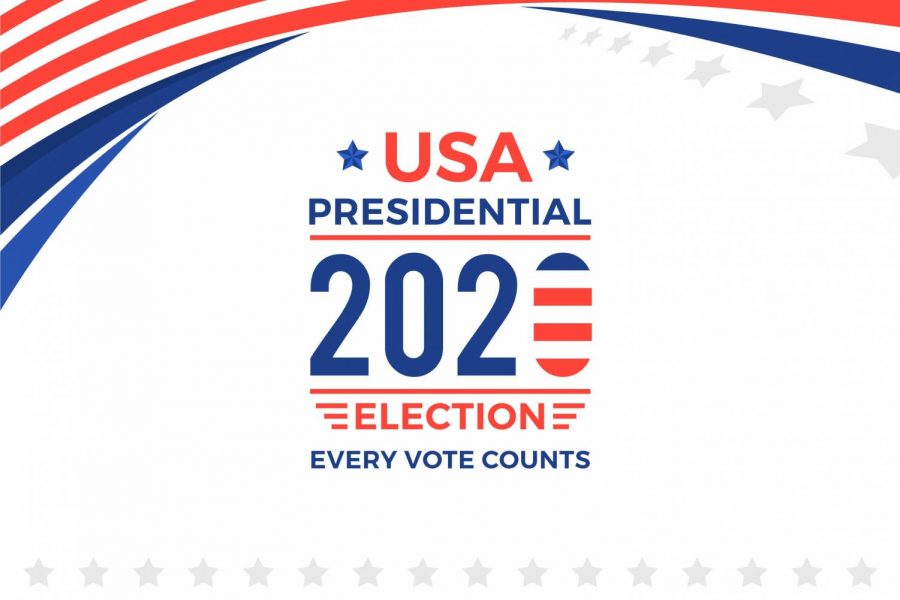Teachers and Students Weigh in on the Election
October 6, 2020
November 3, 2020. It is one of the most anticipated presidential elections in history. The American people will be tasked with deciding between the Democratic nominee, former Vice President Joe Biden, and the Republican nominee, incumbent POTUS Donald Trump.
In 2016, Trump defeated Hillary Clinton to claim the White House. Clinton, however, won the popular vote. This was one of only five elections in history that the winner of the popular vote did not win the electoral college, and therefore the presidency. This poses a question that needs to be discussed more: Is the Electoral College necessary when it can pick a candidate that the majority of America voted against?
But the past is the past; let’s look ahead to the debates and the election.

The first debate happened last Tuesday. Trump failed to condemn white supremacists when given the chance. Biden couldn’t get a word in because Trump interrupted at every opportunity. Moderator Chris Wallace, a Democrat, and host of Fox News Sunday, did all that he could to give Biden a chance to speak. However, there is only so much you can do when tasked with getting a President of the United States to stop talking. Biden stumbled on his words quite a bit. It’s hard to tell if that was just himself or if Trump’s interrupting had something to do with that.
The second is set for October 15, and the third and final debate will be on October 22. They will be moderated by C-SPAN’s Steve Scully and NBC’s Kristen Welker, respectively.
A handful of the important issues that will be discussed in the three Presidential debates starting in September are health care, foreign policy, immigration, civil rights, gun control, women’s rights, and many more.
Another topic that will be discussed in the debates is how to proceed with filling the late Supreme Court Justice Ruth Bader Ginsburg’s seat in the Supreme Court. Conservative judge Amy Coney Barrett was nominated on September 26 by Trump to replace Justice Ginsburg. Trump and several Republican Senators have indicated that they will try to approve Barrett before the election, to make sure that whether Trump wins or loses he will still get to choose the next Supreme Court Justice. This fact has drawn much controversy around it because of similar events that occurred at the end of President Obama’s second term. Supreme Court Justice Anton Scalia had just passed away, and these same senators, as well as Trump, argued that the new President should choose the next Justice, not the current one. Those statements have come back to haunt them, as they are arguing for the current President to choose the next Justice, not the new one. This has led to plenty of accusations of hypocrisy from Democrats, as well as many media outlets. If approved, Barrett will become Trump’s third Supreme Court Justice pick in four years. His three picks have been to the chagrin of many liberals, as Barrett’s approval would majorly shift the Supreme Court to the right.
But none of this will matter for Democrats if Biden doesn’t win the election, which is no easy task. However, most experts on the election are saying that Biden has anywhere from a 65% to 80% chance to win. To be fair, a lot can change in a month. Or a week. Or a day. Though most experts are favoring Biden, a victory is far from guaranteed. In 2016, Hillary Clinton was also expected to beat Donald Trump, and we all know how that turned out.

Another question that isn’t talked about enough is whether or not being impeached by the House of Representatives will significantly hinder Trump in the election. Although he wasn’t acquitted by the Senate, he remains impeached. It should be interesting to see if that fact will have any impact on undecided voters.
The most important thing this November is for every eligible citizen to vote, no matter who they vote for. Voting is the core of democracy, and to not vote is to disregard it.
“It’s hard for me as I’m not really a fan of either candidate, but I do think that the election is a confidence vote in the government. And I certainly want to make very clear my unhappiness with the current government,” Ben Tomasic ‘21 said. Tomasic is a senior who will be voting in the upcoming election.
There are more things on the 2020 ballot than just the Presidential race; such as some very impactful races for the Senate.
The incumbent Senator from Maine, Susan Collins (R), has cast crucial votes over Trump’s presidency. She has voted to repeal the Affordable Care Act in multiple bills, swear in the highly contested Justice Brett Kavanaugh, and not to remove the President from office after his impeachment. She is the underdog in a tight race this year with a democrat who, if elected, would dramatically help democrats even out the Senate.
In Texas, Sen. John Cornyn (R) is up for reelection. He is running against Air Force Veteran MJ Hegar (D). Hegar would greatly aid the democrat’s effort to take back the majority in the Senate. This outcome is very unlikely, as polls show Cornyn having a significant lead.
Regardless of your political opinion, it’s hard to deny that this election may be the most important in recent history.
“The mystique of the 2016 election amplifies the importance of this one. I expect this election to live up to the hype,” US History teacher Brian Farda said.
Senior Kendall Schlegel will be able to vote for the first time this November.
“I think especially with the Coronavirus, the winner will decide how the country reacts. Whether they shut down the economy or not, which I think would be a very bad idea,” Schlegel said.
However, many of our readers are too young to vote in 2020. So if you can’t, you should still stay informed about the election, the President, and the issues that are gripping the country. Because even if you aren’t able to pick a candidate yet, whoever becomes President will have an impact on your life.

















